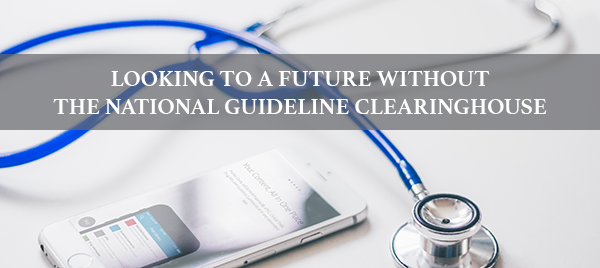
Recently, you may have heard that the National Guideline Clearinghouse (also known as NGC and guideline.gov) website will shut down after July 16, 2018. This abrupt end to a staple for healthcare professionals is due to defunding of some of AHRQ’s programs. If you are one of the two million visitors to the National Guideline Clearinghouse each year, you are probably wondering ‘What other options do I have once NGC shuts down?’ This post was created to give you a few ideas, as well as look at what could be following in National Guideline Clearinghouse’s footsteps in the future.
The Closest Alternative to NGC
Guideline Central
For the past 17 years, Guideline Central has been heavily involved in the evidence-based guideline community. Like NGC, Guideline Central works with leading medical specialty societies to create and disseminate quick-reference summaries of clinical practice guidelines. Guideline Central’s core products are “pocket guidelines” – brief, algorithmic tools developed with 35+ medical association partners, and made available in both print and digital formats. Unlike NGC summaries, these pocket guidelines do require a purchase (most fall in the $4.99-$9.95 range), but some are free. Guideline Central is also releasing a subscription-based product along with the American Medical Association (AMA) that will make all 200+ titles available for roughly $180 per year, or under $0.95 per guideline and include medical codes.
Even though some of Guideline Central’s resources require a purchase, the bulk of them do not. Guideline Central has a website and mobile app that includes thousands of other guideline summaries and clinical resources for free. Examples of the freely available resources include:
- 2,000 guideline summaries syndicated from the National Guideline Clearinghouse
- 100+ interactive clinical calculators
- The United States Preventive Services Task Force (USPSTF) Recommendations for Primary Care Practice
- MEDLINE/PubMed search access
- ClinicalTrials.gov search access
- Quality measures from NGC’s sister site, the National Quality Measures Clearinghouse (NQMC)
- Drug lookup and pill identifier
- Guideline Central mobile app links
The above tools are available to view in mobile app and download for offline access. Furthermore, many of NGC’s guideline summaries are currently available within Guideline Central’s website and app for free. Even though Guideline Central will never be a replacement for the great work done by NGC, for the reasons mentioned above it can be considered a great alternative to fill the gap left by NGC and to minimize the initial shock of losing such a great resource.
Other Great Alternatives to NGC
PubMed
When used correctly, PubMed can be a fantastic resource for locating clinical guidelines. PubMed comprises more than 28 million citations and abstracts of biomedical literature. With all of that content, you’ll never run out of options. However, the downside of a library of that size is that It can be difficult at times to find what you’re looking for through the clutter. For that reason, we suggest using some of the advanced search queries identified in this article from the National Institutes of Health (NIH). You can find other advanced search tutorials online, as well as PubMed’s advanced search builder tool.
Medical Society/Guideline Developer’s Websites
If you’re looking for clinical practice guidelines, there is no better place to go than the source – the medical specialty associations that publish guidelines. In addition to the full-text guideline, most guideline developers also create and post links to other valuable guideline implementation tools. Examples include one-page summary sheets, webinars, podcasts, companion publications, patient information, translated manuscripts and much more. When looking for a guideline from a particular organization there are always two places to look – the developer’s own website, and the main medical journal site for that organization. We suggest to start with the developer’s website, as that’s where you can usually find any supplemental implementation tools alongside the full-text guideline. If you strike out there, you can then check the journal website – you’re almost guaranteed to find it in one of these two areas.
Something else to think about: developing high-quality clinical guidelines is extremely expensive and time-consuming. If you find value in clinical practice guidelines, and you would like to continue seeing guidelines created and updated regularly, please take the time to support and thank these fantastic organizations for the great work they do. While everyone may not agree with every recommendation in every guideline, most will agree that the continued creation and dissemination of guidelines is critical to improving the quality of care and patient outcomes across the globe. That’s why we’re all here, isn’t it?
Looking to the Future
There’s no denying that the loss of NGC will be a great one – not only for the evidence-based medicine community but for the healthcare community as a whole. We here at Guideline Central believe it’s imperative that clinicians have quick, easy and free access to clinical practice guideline summaries. For that reason, Guideline Central is in the process of finalizing plans to create a new guidelines repository if the National Guideline Clearinghouse is not able to be sustained past July 16th (whether it will be is not certain, but looking less likely with each passing day). The team at Guideline Central is committed to ensuring that this resource is not only comparable in size and scope to the current NGC but also made/kept available for free. Whether you are a guideline developer, a practicing clinician, a researcher, like-minded organization or anyone else who uses the current NGC, we would love to hear your feedback. Any parties interested in learning more about this can contact the Vice President at Guideline Central, Chris Wise, at cwise [at] guidelinecentral.com.